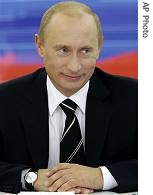-
(单词翻译:双击或拖选)
By Bill Gasperini
Moscow
23 November 2006
Relations between Russia and the European Union have come under strain just as Russian President Vladimir Putin is due to meet European leaders Friday in Finland. Disputes over agricultural imports and energy issues have arisen in an increasingly complex relationship. Bill Gasperini has this preview of the summit from Moscow.
----
 |
| Vladimir Putin |
Russian officials are rejecting renewed calls from the European Union to sign a new energy charter that would open its oil and gas market to foreign investment.
Brussels says the charter is necessary to boost security and efficiency, especially in the pipeline1 network from Russia that supplies the European Union with about one-third of its energy needs. Moscow insists it must retain control over, what the Kremlin calls, Russia's strategic resources.
But this long-standing dispute is overshadowed by an open split over agricultural imports.
New EU member Poland has blocked Europe's plan to open talks at the summit on a new cooperation agreement with Russia until Moscow agrees to lift a ban on Polish food products. The ban was imposed a year ago due to alleged3 violations4 of health regulations.
And Russia's envoy5 to the European Union, Sergei Yastrzhembsky, says Brussels should not allow one member country to hold up progress on improving relations.
Mr. Yastrzhemsky says that the ball is in Europe's court and that it holds all the cards in terms of working out its problems at home.
Meanwhile, Russia is threatening to ban food and dairy imports from the European Union on January First, amid new concerns about hygiene6 in Bulgaria and Romania, which are due to join the bloc2 on that date.
An EU spokesman says such a total ban would be unjustifiable because Europe has taken precautions to insure sanitation7 and safety on all products within its single market.
It remains8 unclear whether the threatened ban is a response to Poland's move. But Russian officials have long complained that countries from the former Soviet9 bloc, such as Poland, are pursuing anti-Russian policies due to bitterness left over from the Soviet era.
Other tensions exist over issues such as the enforcement of environmental standards, as Russia and its EU neighbors grapple with an increasingly complex relationship.
 收听单词发音
收听单词发音
1
pipeline

|
|
| n.管道,管线 | |
参考例句: |
|
|
|
2
bloc

|
|
| n.集团;联盟 | |
参考例句: |
|
|
|
3
alleged

|
|
| a.被指控的,嫌疑的 | |
参考例句: |
|
|
|
4
violations

|
|
| 违反( violation的名词复数 ); 冒犯; 违反(行为、事例); 强奸 | |
参考例句: |
|
|
|
5
envoy

|
|
| n.使节,使者,代表,公使 | |
参考例句: |
|
|
|
6
hygiene

|
|
| n.健康法,卫生学 (a.hygienic) | |
参考例句: |
|
|
|
7
sanitation

|
|
| n.公共卫生,环境卫生,卫生设备 | |
参考例句: |
|
|
|
8
remains

|
|
| n.剩余物,残留物;遗体,遗迹 | |
参考例句: |
|
|
|
9
Soviet

|
|
| adj.苏联的,苏维埃的;n.苏维埃 | |
参考例句: |
|
|
|















